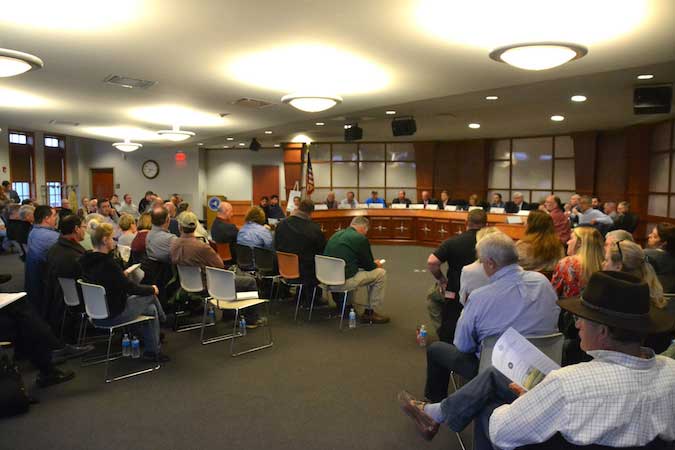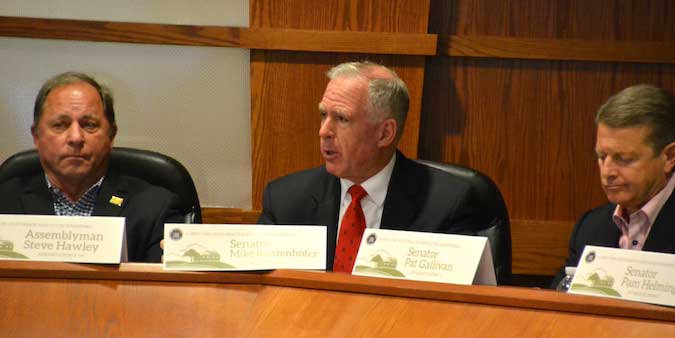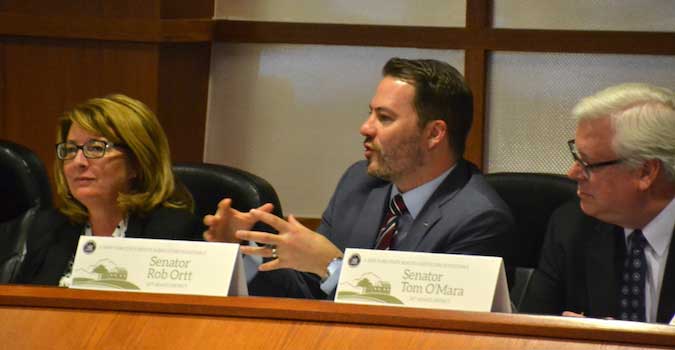Farmers say legislation intended to help farmworkers would result in less hours, pay
Ag community encouraged to show up by the thousands in Albany
BATAVIA – Legislation proposed in Albany that would give farmworkers overtime pay and the right to collective bargaining would actually lead to less pay for workers, who would get fewer hours, and would further strain the finances of the state’s struggling agriculture industry.
That was the message Thursday during a roundtable discussion at Batavia City Hall, which included seven state senators and several farming leaders in Western New York.
State Sen. Rob Ortt, R-North Tonawanda, led the roundtable because he was frustrated three public hearings on the proposed legislation are not in WNY, which is an agricultural powerhouse for fruit, vegetable and dairy farming. Those are all labor-intensive industries. Ortt is the ranking Republican on the State’s Agriculture Committee.
“We understand the impact of this on your livelihood and our state,” Ortt told about 75 people at the 2-hour meeting in Batavia.

About 75 people attended the roundtable discussion on Thursday. The state senators at the meeting said they were disappointed there weren’t any hearings in Western New York about the proposed legislation.
This bill is currently in the Labor Committee of the Senate. The Farmworkers Fair Labor Practices Act is sponsored by State Sen. Jessica Ramos of Queens. She just took office in the Senate this past Jan. 1.
Farmers at the roundtable said the legislation requiring time-and-half after 8 hours in one day and 40 hours in a week would increase their costs from 17 to 25 percent. Some of the farmers, like fruit grower Jeff Toussaint of Knowlesville, said they would have to look at a different type of farming with far less labor costs. For Toussaint that could mean removing fruit trees and planting corn and soybeans.
He has 19 employees right now, including some who come through the federal H2A program, allowing temporary guest workers from other countries. This year those workers are guaranteed $13.25 per hour and the farmers have to provide them housing.
The farmers said labor costs have been on the rise with the state’s minimum wage increases and the H2A rates, which are all set by the government. When those wages go up, farmers increase the wages for middle managers, herdsmen and others who are above the minimum wage.

Leandro Mateos of Torrey Farms said workers don’t want to see their hours get cut.
Leandro Mateos has worked for Torrey Farms for 30 years. The workers are concerned the state legislation will result in less hours, and smaller paychecks. He said the workers want to work the hours, often in excess of 60 hours a week.
Christian Yunker, a partner with CY Farms and president of the Genesee County Farm Bureau, said the 8-hour daily cap before overtime would be very hard for agriculture, where there are often several slow days from rain and then some long days to make up for the bad weather when the sun is out. The planting and harvest seasons tend to be especially busy, with farms racing to get a lot of work done.
If legislation is passed for farmworkers’ overtime, Yunker said it needs to be based on a weekly amount, and he said overtime shouldn’t kick in until at least 60 hours in agriculture.
CY has 40 full-time employees working about 6,000 acres in Genesee and Orleans counties. If the overtime goes through, Yunker said farms would look to limit the weekly hours to 40. The farms would look to expand its workforce to stay under the 40-hour cap and still get needed work done. However, the labor market is tight, making it unlikely there are more workers who could be hired.
With the H2A program, the workers won’t want to be in a state where they would be capped at 40 hours, he said.
“They’ll go to Michigan,” he said in an interview.

State Sen. Michael Ranzenhofer, center, of Amherst is joined up front by State Assemblyman Steve Hawley of Batavia, left, and State Sen. Patrick Gallivan of Elma.
The proposed state legislation puts NY agriculture at a competitive disadvantage with other states and countries, where the labor costs would be much lower, the ag leaders said at the roundtable.
It also jeopardizes the many food processing plants in region, which use local milk, fruits and vegetables. If the input costs are up for those products, the processing plants will look to other states with lower costs, said Steve Hyde, president of the Genesee County Economic Development Center.
State Sen. Michael Ranzenhofer, R-Amherst, represents Genesee and parts of Monroe and Erie counties. He said the best hope of fighting the legislation is for farmers and their workers to show up in Albany in big numbers to speak with state legislators and the media.
“We need thousands of people across the state to come up (to Albany),” he said.
Farmers said they would reach out to the ag community to see if they could get a big crowd to the state capitol soon. The timing is bad for them because they have been anxious for the weather to break so they can plant crops.
Ranzenhofer urged them to set aside a day and get to Albany.
The Senate is in solid Democratic Party control for the first time in decades. The Democrats also have the majority of the Assembly and the governor’s office. That has the agriculture community and seven Republican state senators at Thursday’s roundtable concerned that legislation will pass giving farmworkers overtime and the right to collective bargaining.

State Sen. Rich Funke, right, of Fairport said the proposed legislation would have a very adverse effect on agriculture, further challenging the rural economy. State Sen. Tom O’Mara of Big Flats is at left.
Yunker is hopeful some middle ground can be reached. He’s OK with collective bargaining but doesn’t want workers to have the right to strike during harvest or at dairy farms when animals need to be milked typically three times a day.
If the legislation passes, as proposed, CY would see its labor costs go up 20 to 25 percent, he said.
“Our business would change dramatically,” he said.
The state senators said the Senate used to be a check in governing the state from more liberal or progressive legislation from New York City area lawmakers. Now, Gov. Cuomo is the best hope for the upstate to push back some of the legislation, some of the state senators said.
And the Republican senators said they are trying to make the case to their Democrat colleagues about the impact of the legislation.
Rich Funke, R-Fairport, said the farmworker legislation poses a big threat to the upstate economy, which depends on a viable agriculture sector to maintain the tax base and support other businesses, such as veterinarians, tractor and equipment dealerships.
“This is the single greatest attack being launched on Upstate New York since I’ve been in office,” Funke said.
The legislation is proposed at a time of crisis in the dairy industry, where 20 percent of those farms have gone out of business the past five years.
Ortt said the state is unfortunately adding to challenges for farms struggling to survive.
“If this goes through it will change how people farm and the ag industry in New York forever,” Ortt said.





























































